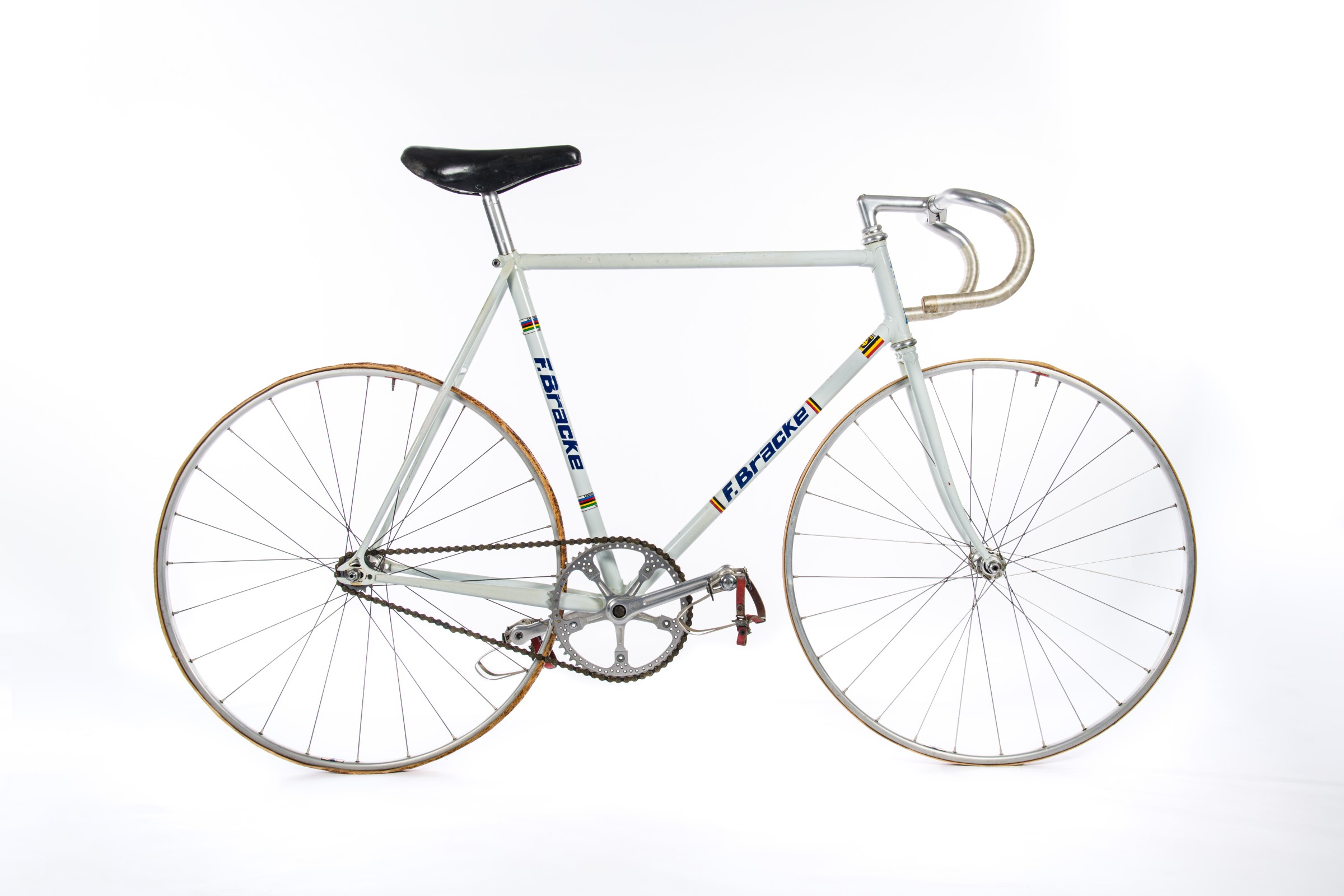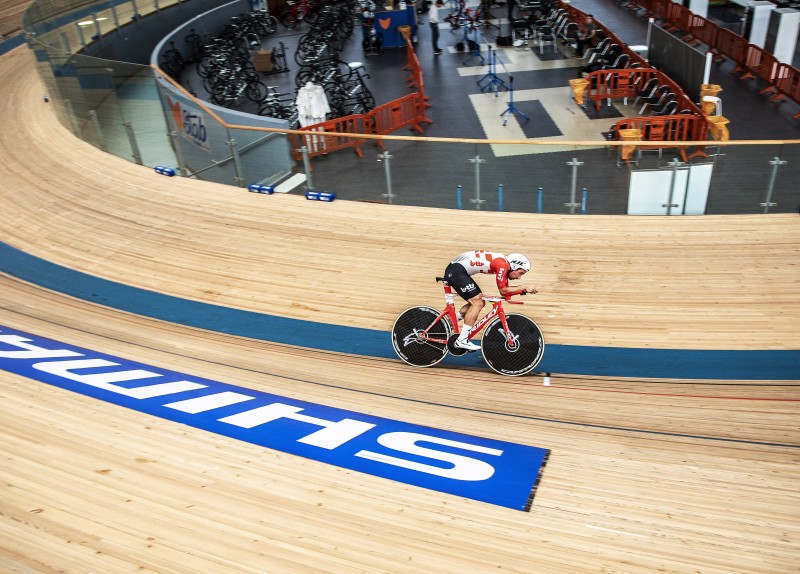We sit down with Ferdinand in the summer of 2022. The welcome in Laneffe, near Charleroi, is cordial. The now 82-year-old former rider immediately leads us outside and installs himself in the beautifully tended garden. On a perfectly maintained lawn, a flower-basketed two-wheeler catches the eye. The bike is there for a reason; the wheels of the garden specimen were made by his brother. An important souvenir, he tells us.
Ferdinand's life story starts in the East Flemish town of Hamme. Little Ferdinand is only a year old when his parents decide to emigrate to Wallonia in 1940. As a result of that move, the young Bracke soon mastered the French language. A major advantage in the world of cycling at the time, where French was the language of choice.
Bracke never considers returning to Flanders. With Christine, a Walloon, he also finds the love of his life in the south of the country. The fact that he still speaks excellent Dutch in 2022 is mainly thanks to his mother: "At home we still spoke Flemish. In fact, both my parents were fervent cycling fans. However, the microbe only struck me later in life."
Early on, Bracke combines a job in a factory with a career as a rider: "I worked in shifts to then be able to train after hours." Among amateurs, Bracke manages to take some fine victories - not in a group sprint but invariably alone. That the Walloon Fleming rides solo to the finish is no coincidence. Squirming in a peloton does not suit him very well. So he goes it alone. It also helps revealing his excellent time trial skills.
The young Belgian showes himself to the international cycling public for the first time at the Peace Race, where he wins a stage after a short solo. As a non-pro, he stunts again in autumn 1962 by clocking the fastest time in the Grand Prix des Nations - a renowned time trial for professional cyclists: "I will never forget how Monsieur Marchant wrote in the French sports newspaper L'Equipe that he was very impressed by 'that young Belgian'. That win earned me a contract the with Gaston Plaud's Peugeot team."
Bracke will race in the black and white chequered jerseys of the top French team for more than a decade: "When my contract was terminated, it hurt. Team manager Gaston Plaud also had to leave the job. A new management came in and they wanted to go in a different direction with the team." In his Peugeot years, Bracke not only built up an impressive record.
Now they almost stagger when a time trial is scheduled in the Tour. I even rode a time trial of around 150 kilometres once!
During his team at Peugeot, Bracke has a chance to work with some extraordinary riders, such as Tom Simpson and Eddy Merckx. "Simpson was an individualist, but you have to be that to be a top rider," he said. In 1966 and 1967, one Eddy Merckx is also part of the Peugeot team. Together with Eddy, he wins the Trofeo Baracchi twice. It was a renowned duo time trial, that has vanished from the calendar. Bracke regrets the decline: "Now they almost stagger when a time trial is scheduled in the Tour. I even once rode a time trial of around 150 kilometres! Oh well, the UCI makes too little money with individual time trials as a separate race."
Bracke also proves to be extremely talented on track. In 1964, he becomes world champion in the pursuit for the first time. In the stands, one Roger Rivière closely follows his exploits. Rivière, himself a triple world pursuit champion, holds the world endurance record in both 1957 and 1959 and is the title holder in 1964.
From the stands, the Frenchman can see that Bracke has a lot of potential: "Roger spoke to me after my World Championships title. He told me that if I was 100%, I would be able to break the hour record. That's where the seeds of my attempt a few years later were sown." The challenge for Bracke is great. Only three years later, he considers himself ready for an attack.
Meanwhile, French hard rider Jacques Anquetil has sharpened Rivière's record. But afterwards, Monsieur Chrono refuses a doping test, so his hour record is not homologated by the UCI. When I remark that technically he then improved Rivière's record, the otherwise very affable Bracke reacts with a moment's pique: "Excuse me, I improved Anquetil's record, not Rivière's. For me, Jacques was one of the all-time greats. His time was really a milestone. That I managed to improve his record was really very special for me."
On 30 October 1967, the day starts with rain. The choice of an autumn date is no coincidence: "At the beginning of the season, I was not always in top form. Moreover, I was not a flandrien. But in October, the period of time trials, I was always there." At the open velodrome in Rome, Bracke waits patiently until the heavens close their gates. Bracke deliberately chose Rome: "A lot of records were broken on the half-covered Vigorelli velodrome in Milan. But I didn't feel quite right there. The track in Rome suited me better."
The 500 Italians present counted for 1,000 Belgians and made themselves heard constantly.
Around five in the afternoon, Ferdinand considers the time ripe to launch his attack. Equipped with a bike made by renowned Italian frame builder Masi, special shoes that should be windproof and an aerodynamic body fitted with rainbow sleeves, the Walloon Fleming sets off. There are not really many spectators present, but that is no obstacle: "The 500 Italians present counted for 1,000 Belgians and constantly made themselves heard."
After one hour of cycling, Ferdinand has covered more than 48 kilometres. He thus improves Anquetil's record by 600 metres. Afterwards, Maître Jacques does not hide his admiration: "Bracke's record is formidable. There is not much more to add to it. Records are there to be broken and that's a good thing. This record too will one day be consigned to the archives."
In addition to the hour record, Bracke experiences several other highlights. During the 1969 World Championships on the track in Antwerp, he overcomes all opposition: "At that time I was in the shape of my life. In the series and the following rounds of the pursuit, I overtook all my opponents and became world champion in the pursuit for the second time."
Two years later, Bracke wins the Tour of Spain by a minute ahead of teammate Wilfried David: "I owed a lot to my teammates, especially Walter Godefroot who signed with Peugeot in 1971. Three years earlier we had been in the team together at the Tour, in the Belgian B-team. We got along wonderfully. More than that, he knew my abilities, was also behind my springs and knew how to motivate me. i was like a son to him. He really told me what to do. If only I had always had him in my team..."
Bracke shines one last time at the 1976 Tour. There, at the age of 37, he wins another time trial: "Three days before the end of the Tour, I went flat out again. Unlike many other riders, I explored the course and took the fastest time. As there were still riders to start after me, I went back to my hotel and grabbed a shower. Then it turned out that I had set the fastest time of all."
While saying our goodbyes, Ferdinand shows another album, containing clippings from newspapers the day after his world endurance record. El Pais, Gazetto dello Sport, Het Volk, Het Nieuwsblad, Le Soir, La Nouvelle Gazette,... all blowing the praises of Bracke's achievement. It still gives him visible pleasure to see those titles again. He cherishes the album like a relic, gently stroking it with due care.
In the garage, his hour record bike - still with the now-dead original tyres - waits neatly packed in a box for transport to Roeselare. Behind it is a racing bike on rollers: "I still cycle on rollers three times a week. On public roads I no longer risk myself. Far too dangerous." I dare not ask him to cycle for a while, but the chances of Bracke still pedalling like a stylist after all these years seem pretty good. Once a pedallist, always a pedallist, you know.
The hour record exudes magic. More than that, whoever sets a record is immediately assured of a place in the history books. Exactly 50 years ago,...






